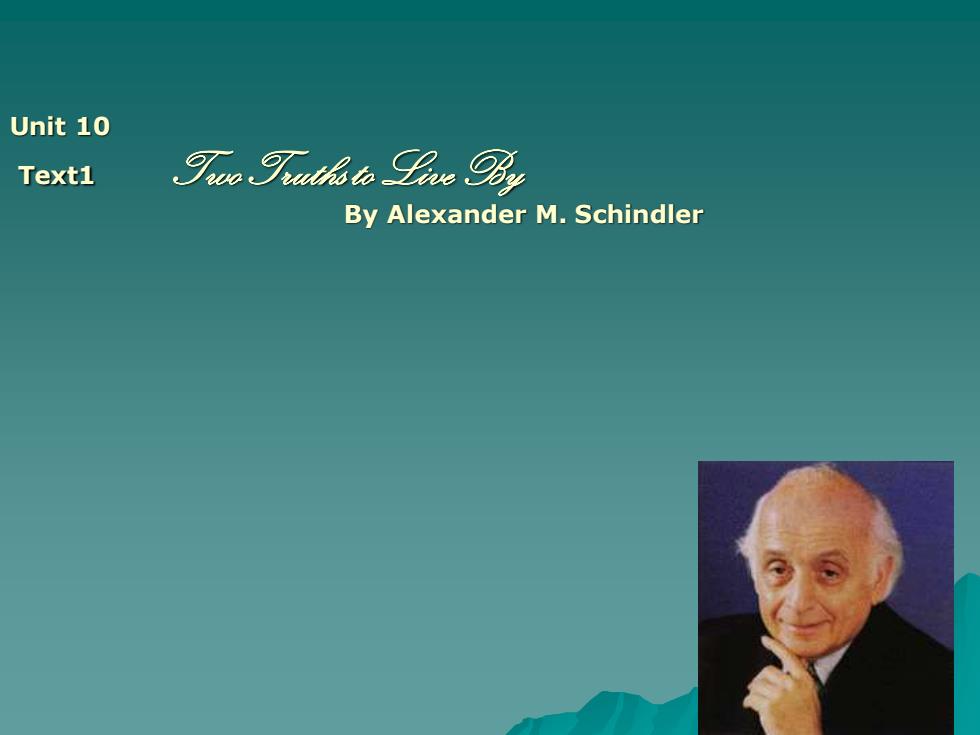
Unit 10 Text1 Ho Hathit Tu By By Alexander M.Schindler
Unit 10 Text1 Two Truths to Live By By Alexander M. Schindler
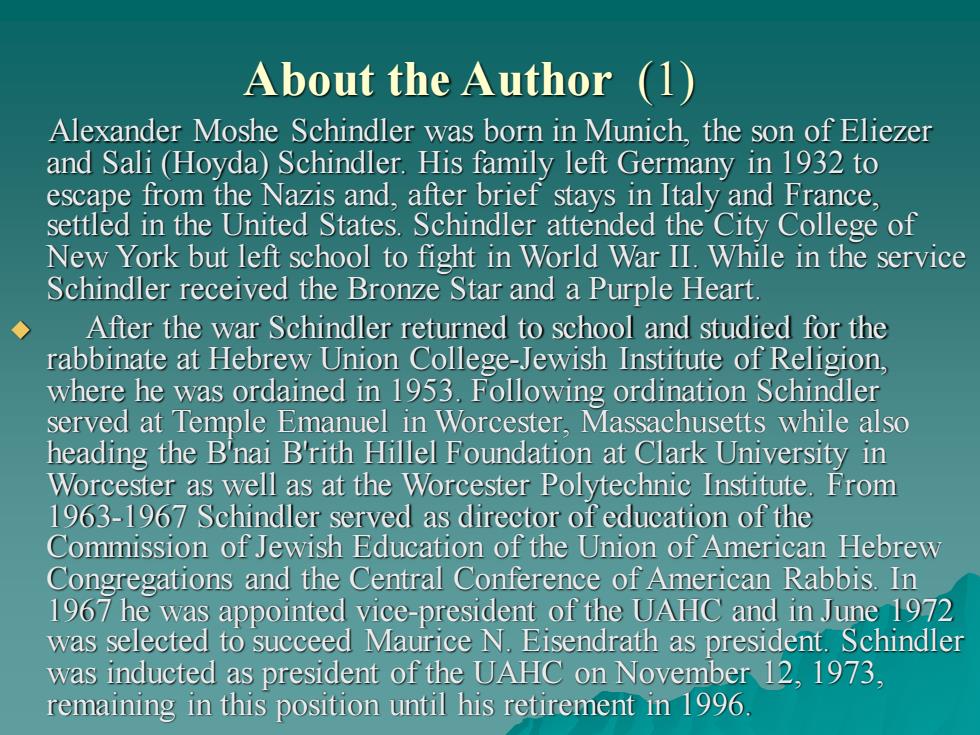
About the Author (1) Alexander Moshe Schindler was born in Munich,the son of Eliezer and Sali (Hoyda)Schindler.His family left Germany in 1932 to escape from the Nazis and,after brief stays in Italy and France, settled in the United States.Schindler attended the City College of New York but left school to fight in World War II.While in the service Schindler received the Bronze Star and a Purple Heart After the war Schindler returned to school and studied for the rabbinate at Hebrew Union College-Jewish Institute of Religion. where he was ordained in 1953.Following ordination Schindler served at Temple Emanuel in Worcester,Massachusetts while also heading the Bnai B'rith Hillel Foundation at Clark University in Worcester as well as at the Worcester Polytechnic Institute.From 1963-1967 Schindler served as director of education of the Commission of Jewish Education of the Union of American Hebrew Congregations and the Central Conference of American Rabbis.In 1967 he was appointed vice-president of the UAHC and in June 1972 was selected to succeed Maurice N.Eisendrath as president.Schindler was inducted as president of the UAHC on November 12,1973. remaining in this position until his retirement in 1996
About the Author (1) Alexander Moshe Schindler was born in Munich, the son of Eliezer and Sali (Hoyda) Schindler. His family left Germany in 1932 to escape from the Nazis and, after brief stays in Italy and France, settled in the United States. Schindler attended the City College of New York but left school to fight in World War II. While in the service Schindler received the Bronze Star and a Purple Heart. ◆ After the war Schindler returned to school and studied for the rabbinate at Hebrew Union College-Jewish Institute of Religion, where he was ordained in 1953. Following ordination Schindler served at Temple Emanuel in Worcester, Massachusetts while also heading the B'nai B'rith Hillel Foundation at Clark University in Worcester as well as at the Worcester Polytechnic Institute. From 1963-1967 Schindler served as director of education of the Commission of Jewish Education of the Union of American Hebrew Congregations and the Central Conference of American Rabbis. In 1967 he was appointed vice-president of the UAHC and in June 1972 was selected to succeed Maurice N. Eisendrath as president. Schindler was inducted as president of the UAHC on November 12, 1973, remaining in this position until his retirement in 1996
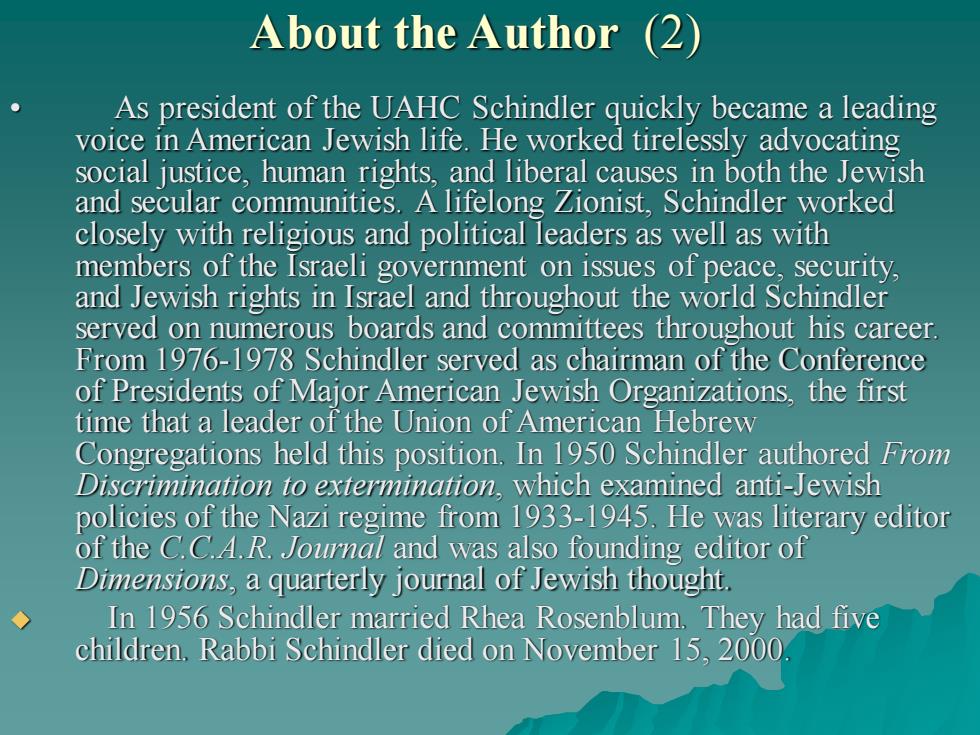
About the Author (2 As president of the UAHC Schindler quickly became a leading voice in American Jewish life.He worked tirelessly advocating social justice,human rights,and liberal causes in both the Jewish and secular communities.A lifelong Zionist,Schindler worked closely with religious and political leaders as well as with members of the Israeli government on issues of peace,security, and Jewish rights in Israel and throughout the world Schindler served on numerous boards and committees throughout his career. From 1976-1978 Schindler served as chairman of the Conference of Presidents of Major American Jewish Organizations,the first time that a leader of the Union of American Hebrew Congregations held this position.In 1950 Schindler authored From Discrimination to extermination,which examined anti-Jewish policies of the Nazi regime from 1933-1945.He was literary editor of the C.C.A.R.Journal and was also founding editor of Dimensions,a quarterly journal of Jewish thought. In 1956 Schindler married Rhea Rosenblum.They had five children,Rabbi Schindler died on November 15,2000
About the Author (2) • As president of the UAHC Schindler quickly became a leading voice in American Jewish life. He worked tirelessly advocating social justice, human rights, and liberal causes in both the Jewish and secular communities. A lifelong Zionist, Schindler worked closely with religious and political leaders as well as with members of the Israeli government on issues of peace, security, and Jewish rights in Israel and throughout the world Schindler served on numerous boards and committees throughout his career. From 1976-1978 Schindler served as chairman of the Conference of Presidents of Major American Jewish Organizations, the first time that a leader of the Union of American Hebrew Congregations held this position. In 1950 Schindler authored From Discrimination to extermination, which examined anti-Jewish policies of the Nazi regime from 1933-1945. He was literary editor of the C.C.A.R. Journal and was also founding editor of Dimensions, a quarterly journal of Jewish thought. ◆ In 1956 Schindler married Rhea Rosenblum. They had five children. Rabbi Schindler died on November 15, 2000
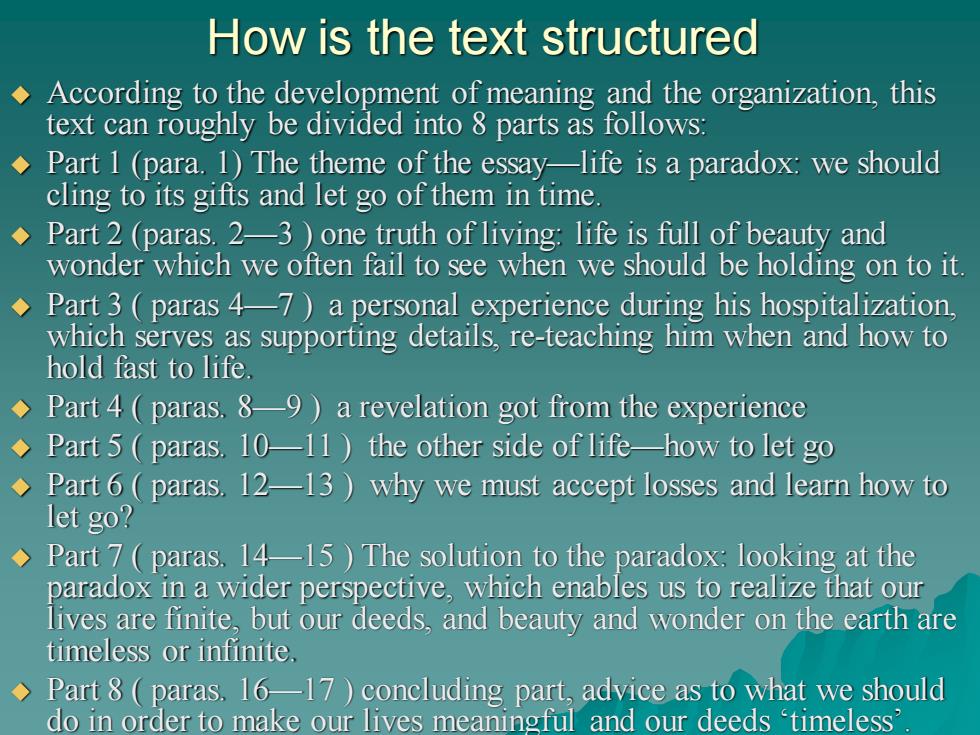
How is the text structured According to the development of meaning and the organization,this text can roughly be divided into 8 parts as follows: Part 1 (para.1)The theme of the essay-life is a paradox:we should cling to its gifts and let go of them in time. Part 2 (paras.2-3)one truth of living:life is full of beauty and wonder which we often fail to see when we should be holding on to it. Part 3 paras 4-7)a personal experience during his hospitalization, which serves as supporting details,re-teaching him when and how to hold fast to life. Part 4 paras.89)a revelation got from the experience Part 5 paras.10-11)the other side of life-how to let go Part 6(paras.12-13)why we must accept losses and learn how to let go? Part 7 paras.14-15 The solution to the paradox:looking at the paradox in a wider perspective,which enables us to realize that our lives are finite,but our deeds,and beauty and wonder on the earth are timeless or infinite. Part 8(paras.16-17)concluding part,advice as to what we should do in order to make our lives meaningful and our deeds timeless
How is the text structured ◆ According to the development of meaning and the organization, this text can roughly be divided into 8 parts as follows: ◆ Part 1 (para. 1) The theme of the essay—life is a paradox: we should cling to its gifts and let go of them in time. ◆ Part 2 (paras. 2—3 ) one truth of living: life is full of beauty and wonder which we often fail to see when we should be holding on to it. ◆ Part 3 ( paras 4—7 ) a personal experience during his hospitalization, which serves as supporting details, re-teaching him when and how to hold fast to life. ◆ Part 4 ( paras. 8—9 ) a revelation got from the experience ◆ Part 5 ( paras. 10—11 ) the other side of life—how to let go ◆ Part 6 ( paras. 12—13 ) why we must accept losses and learn how to let go? ◆ Part 7 ( paras. 14—15 ) The solution to the paradox: looking at the paradox in a wider perspective, which enables us to realize that our lives are finite, but our deeds, and beauty and wonder on the earth are timeless or infinite. ◆ Part 8 ( paras. 16—17 ) concluding part, advice as to what we should do in order to make our lives meaningful and our deeds ‘timeless’
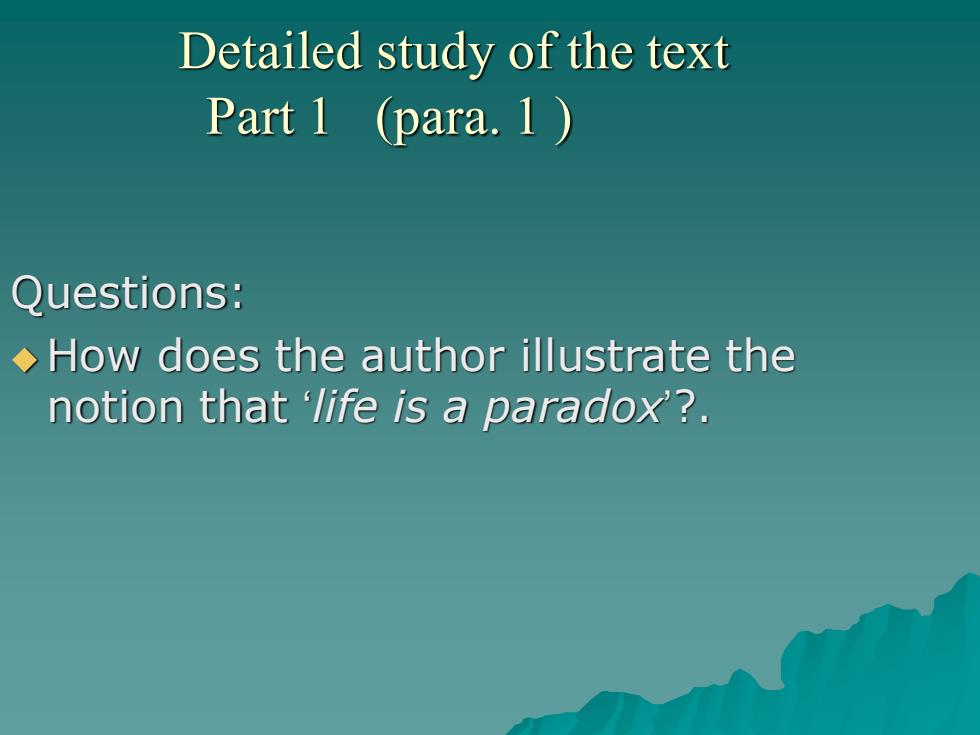
Detailed study of the text Part 1 (para.1 Questions: How does the author illustrate the notion that 'life is a paradox'?
Detailed study of the text Part 1 (para. 1 ) Questions: ◆ How does the author illustrate the notion that ‘life is a paradox’?
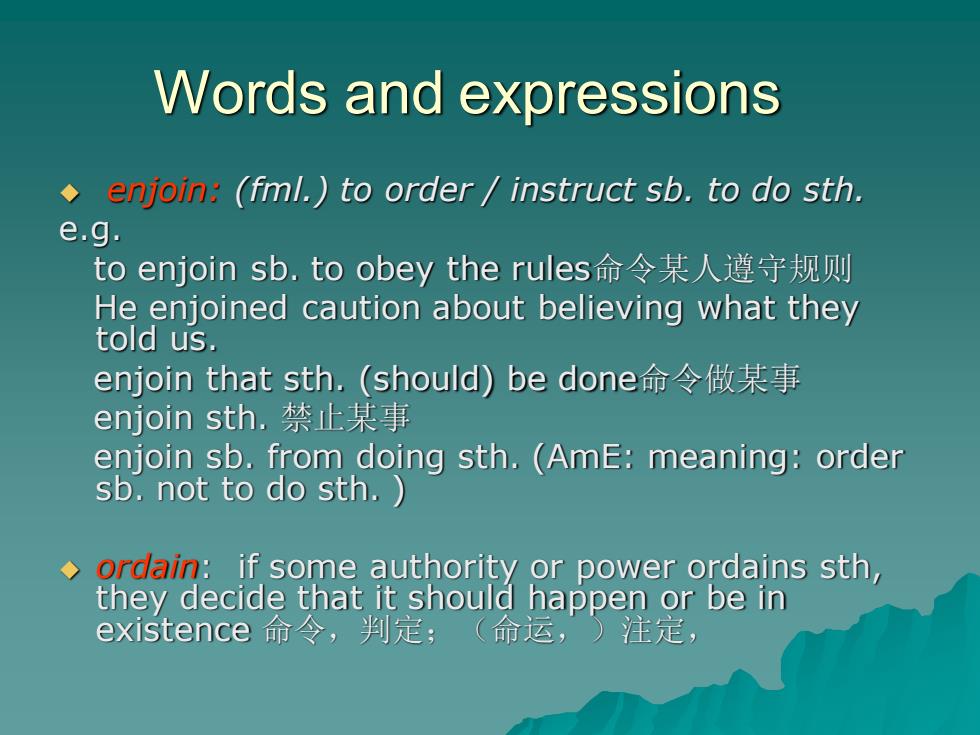
Words and expressions enjoin:(fml.)to order instruct sb.to do sth. e.g. to enjoin sb.to obey the rules命令某人遵守规则 He enjoined caution about believing what they told us. enjoin that sth,(should)be done命令做某事 enjoin sth.禁止某事 enjoin sb.from doing sth.(AmE:meaning:order sb.not to do sth. ordain:if some authority or power ordains sth, they decide that it should happen or be in existence命令,判定;(命运, )注定
Words and expressions ◆ enjoin: (fml.) to order / instruct sb. to do sth. e.g. to enjoin sb. to obey the rules命令某人遵守规则 He enjoined caution about believing what they told us. enjoin that sth. (should) be done命令做某事 enjoin sth. 禁止某事 enjoin sb. from doing sth. (AmE: meaning: order sb. not to do sth. ) ◆ ordain: if some authority or power ordains sth, they decide that it should happen or be in existence 命令,判定;(命运,)注定
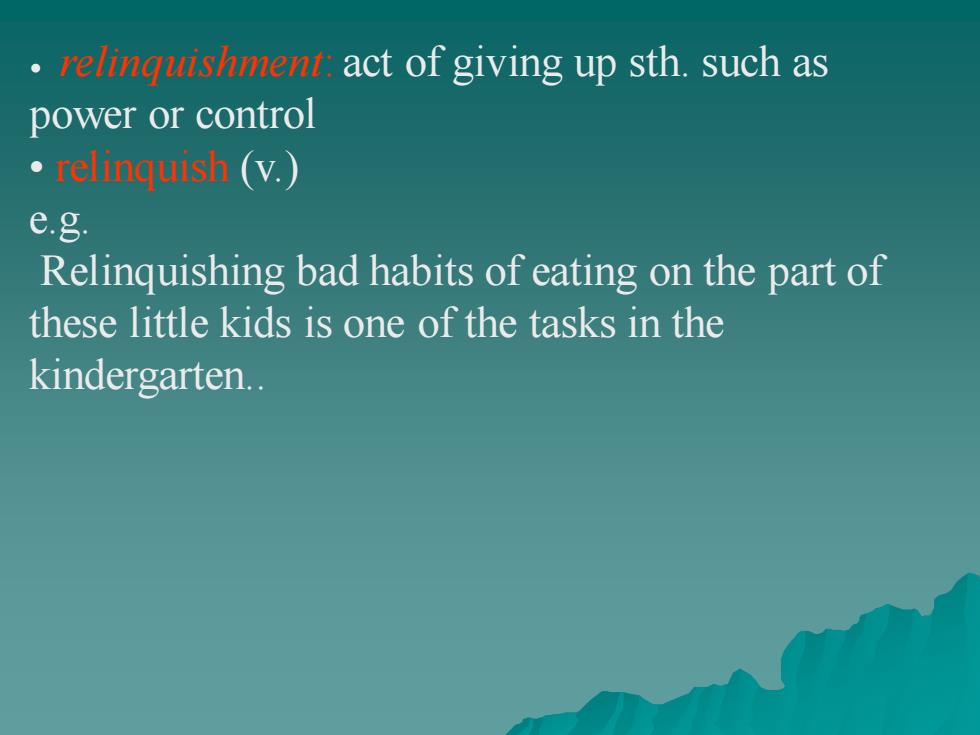
relinquishment:act of giving up sth.such as power or control relinquish (v.) e.g. Relinquishing bad habits of eating on the part of these little kids is one of the tasks in the kindergarten
• relinquishment: act of giving up sth. such as power or control • relinquish (v.) e.g. Relinquishing bad habits of eating on the part of these little kids is one of the tasks in the kindergarten

Part 2 (Paras.2—3) ◆ Question: ◆ What is implied in the phrases 'when it flowered.when it was tendered'?
Part 2 ( Paras. 2—3 ) ◆ Question: ◆ What is implied in the phrases ‘when it flowered. when it was tendered’?
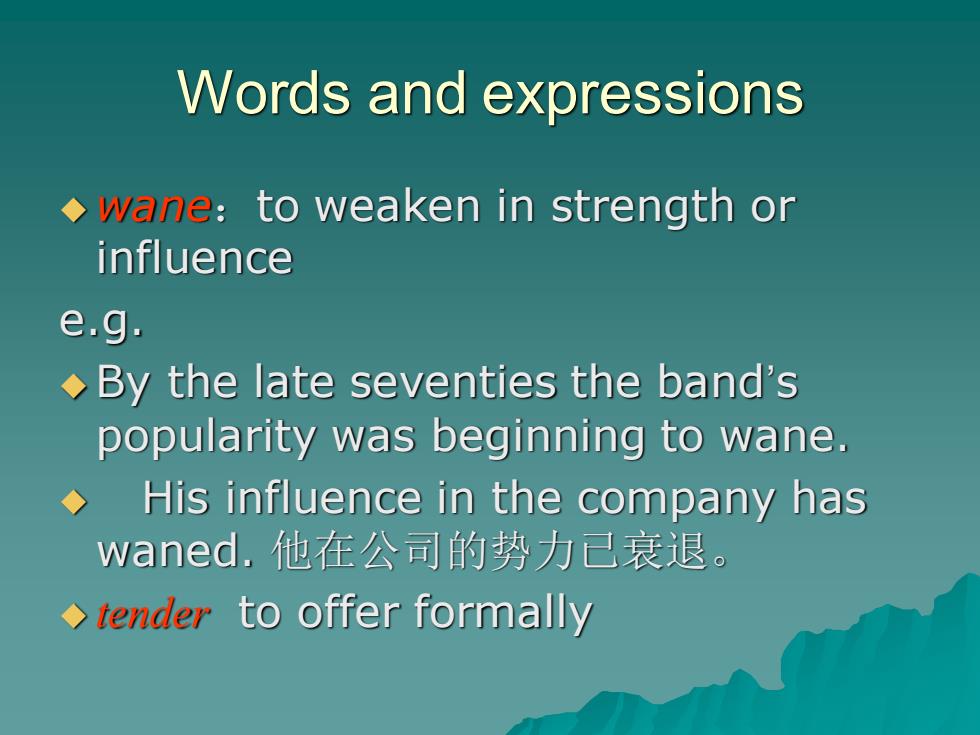
Words and expressions wane:to weaken in strength or influence e.g. By the late seventies the band's popularity was beginning to wane. His influence in the company has waned.他在公司的势力已衰退。 tender to offer formally
Words and expressions ◆ wane:to weaken in strength or influence e.g. ◆ By the late seventies the band’s popularity was beginning to wane. ◆ His influence in the company has waned. 他在公司的势力已衰退。 ◆ tender to offer formally
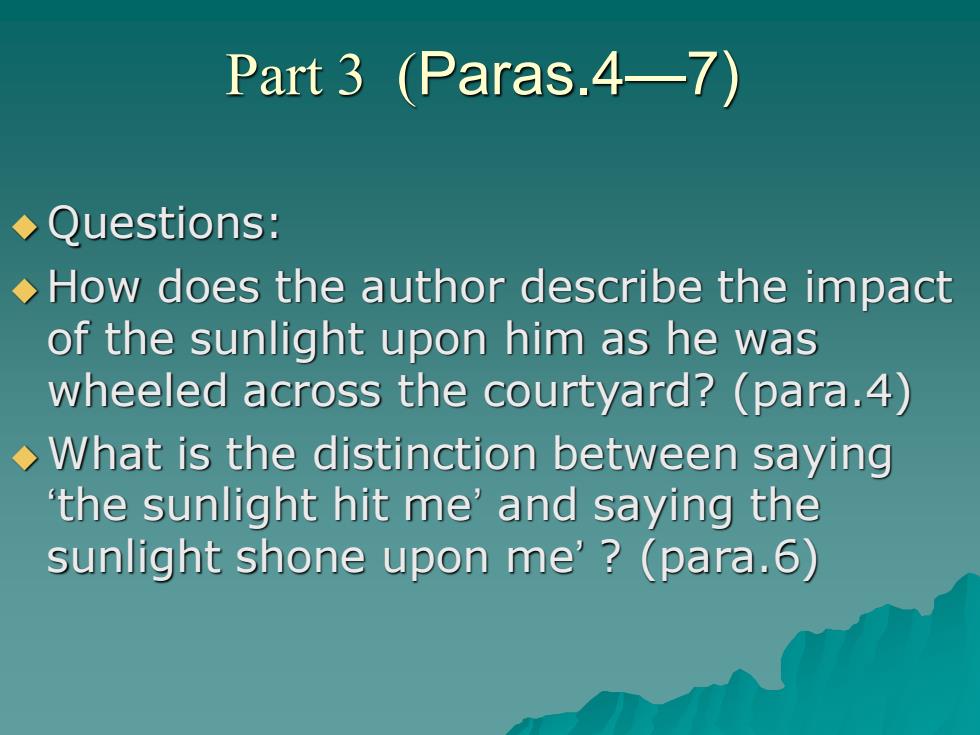
Part3(Paras.4—7) ◆Questions: How does the author describe the impact of the sunlight upon him as he was wheeled across the courtyard?(para.4) What is the distinction between saying the sunlight hit me'and saying the sunlight shone upon me'(para.6)
Part 3 (Paras.4—7) ◆ Questions: ◆ How does the author describe the impact of the sunlight upon him as he was wheeled across the courtyard? (para.4) ◆What is the distinction between saying ‘the sunlight hit me’ and saying the sunlight shone upon me’ ? (para.6)